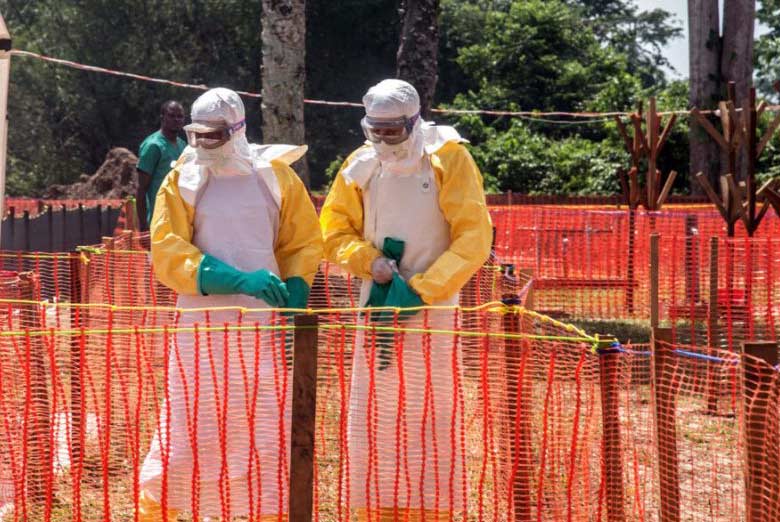PUBLIC HEALTH ADVISORY FOLLOWING DECLARATION OF EBOLA VIRUS DISEASE OUTBREAK IN GUINEA

What is Happening?
The Lagos State Ministry of Health is aware and closely monitoring an Ebola virus disease (EVD) outbreak in Guinea, which was declared on the 14th of February 2021. The cases and deaths were reported in the N’zerekore region of the country. The cases were detected among seven people who attended the burial of a nurse on the 1st of February 2021.
Following the declaration of the outbreak, the Guinean government has initiated response activities. The World Health Organization (WHO), Africa Centres for Disease Control (ACDC) and West African Health Organisation (WAHO) have announced that they are supporting the country’s response activities. The Government of Guinea has begun processes to access the global stockpile of vaccines for EVD, from the Vaccine International Coordinating Group (ICG).
The Nigeria Centre for Disease Control (NCDC) has an existing multisectoral National Emerging Viral Haemorrhagic Diseases Working Group (EVHDWG). This group coordinates preparedness efforts for EVD and other emerging viral haemorrhagic diseases. The EVHDWG has carried out a risk assessment on the possibility of transmission of the virus to Nigeria.
Given the proximity of Guinea to Nigeria and other West African countries as well as other indicators, Nigeria has been placed at moderate risk of an EVD outbreak. The outputs from this risk assessment are being used to initiate preparedness activities in-country.
Several measures have been put in place to prevent and mitigate the impact of a potential EVD outbreak in Nigeria. A National Emergency Operations Centre (EOC) operating from NCDC’s Incident Coordination Centre (ICC) is on alert mode. A team of first responders are on standby, ready to be deployed within 24 hours in the event of an EVD outbreak in Nigeria. Testing capacity for EVD have also been established at the NCDC National Reference Laboratory.
The Port Health Services of the Federal Ministry of Health has scaled up screening at points of entry. The NCDC will also scale up risk communications and other activities.
How is Ebola Virus Disease (EVD) Transmitted?
The Ebola virus can be transmitted via direct contact with bodily fluids of a person who is sick with or has died from EVD. The virus can enter the body stream through broken skin or mucous membranes in the eyes, nose, or mouth. This can also be spread through contact with objects contaminated by infected persons as well as direct contact with the blood, body fluids and tissues of infected fruit bats or primates.
Symptoms of Ebola Virus Disease (EVD)
According to the World Health Organization (WHO), the incubation period, that is, the time interval from infection with the virus to onset of symptoms, is from 2 to 21 days. A person infected with Ebola cannot spread the disease until they develop symptoms.
Symptoms of EVD can be sudden and include:
- Fever
- Fatigue
- Muscle pain
- Headache
- Sore throat
This is followed by:
- Vomiting
- Diarrhoea
- Rash
- Symptoms of impaired kidney and liver function
- In some cases, both internal and external bleeding (for example, oozing from the gums, or blood in the stools).
- Laboratory findings include low white blood cell and platelet counts and elevated liver enzymes.
How to Prevent the Spread of Ebola Virus Disease (EVD)
To prevent the spread of Ebola, NCDC advises members of the public to adhere to the following precautions:
- Wash your hands frequently using soap and water – use hand sanitisers when soap and water is not readily available.
- Avoid direct handling of dead wild animals.
- Avoid physical contact with anyone who has possible symptoms of an infection with an unknown diagnosis.
- Make sure fruits and vegetables are properly washed and peeled before you eat them.
- Health care workers are advised to ensure universal precautions at all times. This includes the use of personal protective equipment always when handling patients.
What is Lagos State Government Doing?
The Lagos State Government is very committed to the health and safety of her citizens, and will continue to work with the NCDC to align strategies and strengthen preparedness activities across the State.
Please report all suspected cases of Ebola Virus Disease to your Local Government Area Disease Surveillance and Notification Officer (DSNO). They are the first link to response and care.
If you notice any of these signs and symptoms, go to the nearest health centre immediately or call Toll-free Number: 6232 | SMS: 08099555577 | WhatsApp: 07087110839
For further enquiries, please contact Lagos State Ministry of Health, Biosafety and Biosecurity Department via:
Phone number: 08093054359
Twitter: @followlasg @LSMOH @profAkinAbayomi @HEFAMAA_LASG
